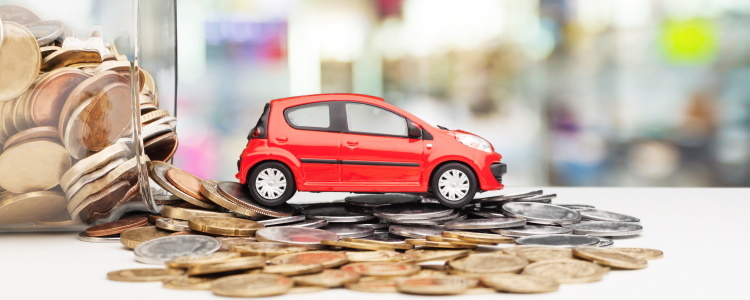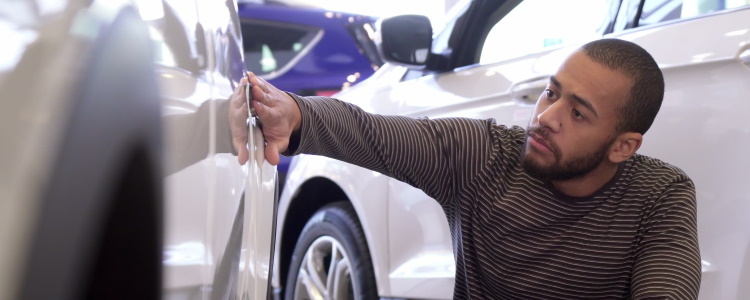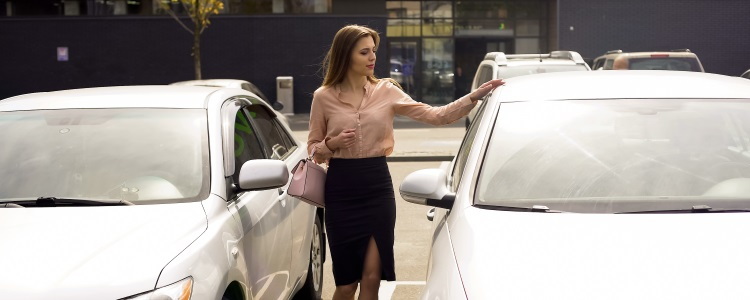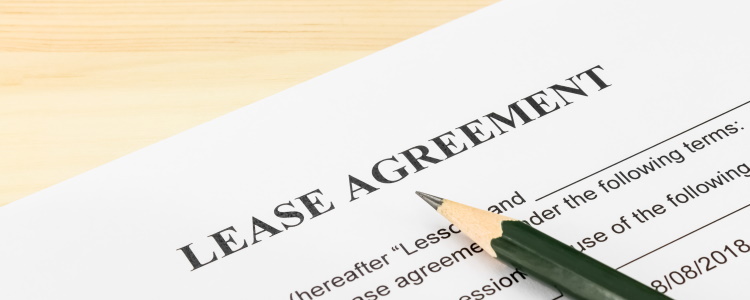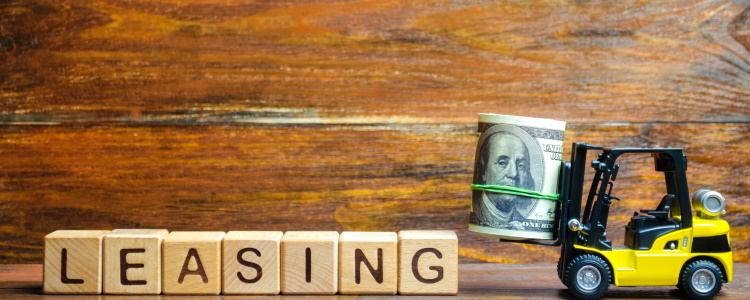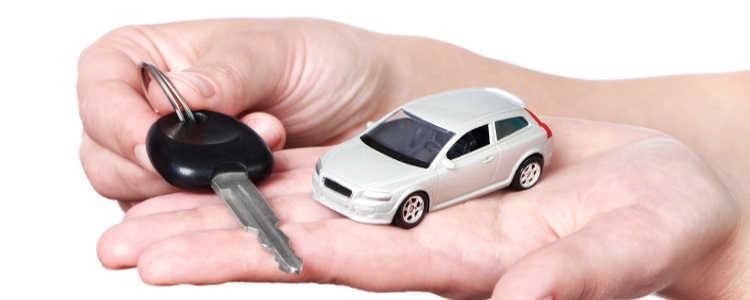There are quite a few differences between financing a car and leasing one. Leasing and buying both allow you to finance a vehicle, but that's basically where the similarities end.
Leasing a car is typically considered to be more affordable than buying a vehicle because you're not paying for the entire price of the car, only the portion of it you use. A lease term is usually shorter than a loan term, and the monthly payment is often lower. Of course, you have to qualify for a lease first – which isn't always easy when you're working with poor credit.
Generally speaking, it’s easier to buy a car with bad credit than it is to lease, but some leasing companies approve bad credit consumers. If you’re on the fence about whether or not you should lease or buy, keep reading to see the differences between the two. Let us explain.
Differences Between Auto Loans and Leasing
Leasing a car is a different ball game than buying, and it's normally only available to borrowers with good credit scores.
Here are the main differences if you’re considering leasing instead of buying:
- Your name isn’t on the leased vehicle’s title
- Lessees are rarely required to make a down payment
- Leased cars have mileage limits
- You may be required to pay a refundable security deposit
- Lease payments are generally lower than financing a vehicle
While there are a handful of differences, financed vehicles and leased cars have some similarities. If you lease, prepare to pay for full coverage auto insurance, title and license fees, and a dealer’s doc fee – just like financing.
Additionally, a good payment history on a lease can build or repair your credit score since leases are reported to the credit bureaus.
Leased vehicles are usually new cars, which gives them a higher initial manufacturer-suggested retail price in many cases. This means they start at a higher price than some of the used vehicles you may be able to finance with an auto loan.
Most lessees are looking to drive a new vehicle with a smaller monthly payment. It’s different from financing, in that you’re only paying for the time you have it – not the full value of the car. Most leases typically last from 24 to 36 months, depending on the leasing company, and your personal preferences, whereas loans are typically 48 to 84 months long.
Once the lease term is over, you return the vehicle to the leasing company. Often, you’re given the option of purchasing the car, as well, and this price is also set ahead of time and listed in the lease. If you decide not to purchase the vehicle, you’re usually free to walk away once you’ve paid the termination fee. However, if the car has excessive wear and tear, or you go over the mileage limit, you’re likely to be charged.
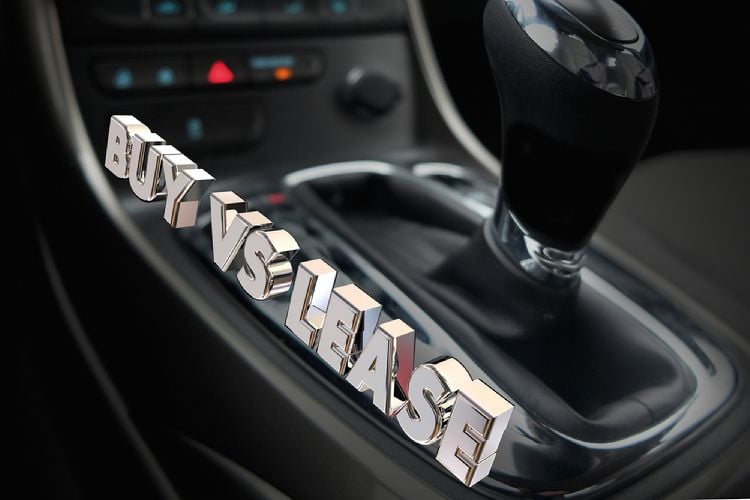
The Pros and Cons of Leasing a Car
Leasing has its pros and cons like any other form of vehicle financing. There are many positive things about leasing a car, even when you have bad credit. However, you should know that the better your credit score, the more likely you are to find a lessor willing to work with you.
Let's look at some of the pros and cons of leasing a vehicle:
Pros:
- Typically, leasing comes with a lower monthly payment and is generally cheaper than buying in the short term because you're only paying for the part of the car you're using. Since you give the vehicle back at lease turn-in, the unused value, called residual value, represents what it can be sold for. The residual value is estimated at the beginning of a lease, and you could walk away ahead of the game if the lessor calculates it incorrectly, but this doesn't often happen.
- There's no down payment involved in leasing. If you use one, it's called a capitalized cost reduction (or cap cost reduction), and it doesn't save you any money in the long run like it does with traditional car financing. You can use a cap cost reduction to lower your monthly payment, but all you're doing is prepaying the lease.
- You get to drive a brand-new vehicle and are only committed for a couple of years. Lease terms are often short, the most common being either 24 or 36 months.
- During a typical lease, the car is covered by a manufacturer-backed warranty, which represents big savings over having to pay for repairs.
This may all sound great, but there are some cons to leasing as well...
Cons:
- Leased vehicles come with mileage restrictions. Turning in a leased car over mileage can result in some major fees – as much as 25 cents for each mile over the limit. If you drive a lot, or have a long commute to work, you may want to reconsider or buy extra miles upfront.
- Fees are charged for any excessive wear and tear. What's considered "normal" wear and tear can vary.
- If you decide leasing isn't for you halfway through your term, you're out of luck. Sure, you can turn in your vehicle early, but you're going to be charged early termination fees plus any remaining lease payments if you do.
- Because you never own the car, you don't benefit from any of the equity. Plus, you may be faced with rising costs each time you have to lease again.
- Even though you don't own the vehicle, the coverage requirements mean insurance premiums tend to be higher than when you finance a car.
If you opt to lease when you're dealing with credit issues, you may have a slim chance for an approval. Lessors typically only approve people with higher credit scores.
However, if you decide to go for an auto loan, and you're dealing with credit challenges, there's a good chance you can get a car loan if you find a dealership that can work with unique credit situations. In most cases, these dealers are signed up with lenders called subprime lenders, who can typically help bad credit borrowers when others can't.
The Pros and Cons of Buying a Car
Buying a car is likely to be one of your biggest purchases – they aren’t cheap! If you don’t pay the entire amount in cold hard cash, you typically borrow from an auto lender. Once you find a vehicle that you want to buy, you’ve got to find a lender to work with to get the car loan you need.
When you finance a vehicle, you typically pay it off in four to eight years, with most loan terms between 48 and 84 months. The amount you borrow is divided into monthly payments. The more you finance, the higher your monthly payment.
While you’re paying on the car, you have ownership rights, and so does the lender. You can drive it as much as you like, customize it, knock it around – it’s your vehicle. But until you complete the loan, your lender can repossess the car if you default or miss too many payments.
To finance a vehicle, you must first find an auto lender. Many borrowers go to their credit union, bank, or through a dealership’s finance department to get financing. But you don’t get to borrow that money for free. When you borrow from a lender, you usually pay interest on the balance of the loan.
Generally, your credit score determines the interest rate. If your credit score is less than perfect, you’re likely to pay more in interest charges, because you're charged a higher interest rate than someone with good credit.
There are a few other costs to consider when you’re buying a car, as well. Be prepared to pay for full coverage auto insurance, title and license fees, a dealer’s documentation fee, and a down payment (depending on your credit history), which may all be required by your lender.
Once a car loan is paid in full, you can choose whatever auto insurance you like as long as it meets your state’s minimum requirements. While you’re financing or leasing, you’re required to maintain full coverage car insurance, which is more expensive than minimum coverage.
One of the biggest benefits of financing a vehicle is that you earn equity. Equity is the difference between how much you owe on the loan, and the car’s cash value. If you owe less on the loan than the estimated value the vehicle would sell for, you’ve got equity. This difference can be put toward future car purchases in the form of trade-in equity when you’re buying your next vehicle.
Additionally, auto loans that are reported to the credit bureaus give you the opportunity to repair or build your credit if you keep up with the payments.
Like leasing, buying has its good and bad points, but purchasing a vehicle is usually easier when your credit isn't the best. In fact, there are special lenders available that provide loans specifically to borrowers suffering with poor credit. One of the highlights of a bad credit car loan is that it helps you improve your credit over time.
Let's take a look at other pros and cons:
Pros:
- You have a better chance of getting approved for an auto loan with bad credit. Subprime lenders look beyond your credit score to help get you approved based on income, residence stability, and employment history.
- Ownership is a big plus to buying a car. This means you can customize the vehicle as you see fit and drive it as much as you want, while the only person who cares about the amount of wear and tear on the car is you.
- Because you're financing, you're still going to be required to carry full coverage insurance. This can be more expensive than the minimum coverage required by your state, but it's most likely less expensive than if you were leasing. And, hey, at least you're covered all the way.
Cons:
- When you're financing, longer-term ownership also means things like your warranty running out (if you have one). This means any necessary repairs have to be paid for out of pocket.
- Your monthly auto loan payments are usually higher when you're financing compared to leasing, especially if you have poor credit.
- Down payments are usually required when you're financing a vehicle with bad credit. Bad credit lenders typically require a down payment of at least $1,000, or 10% of the car's selling price, whichever is less.
Leasing vs Buying a Car with Bad Credit
Now, I know what you're thinking. Sure, you end up paying less across six years when you buy as opposed to leasing two cars back to back, but you're stuck driving a six-year-old vehicle. If you were leasing, you'd be driving around in a new car that's covered by a manufacturer warranty for the entire term every three years or so. Isn't that better? Well, that's apples and oranges.
This is where leasing and buying a vehicle becomes a debate, there's no right answer to the question and it's really up to you as to whether one is a better deal than the other. If you buy a car that retains its value, has great reliability and safety ratings, and the latest technology and safety features for its time, it could still be somewhat comparable to that three-year-old vehicle you lease. Only your car needs, driving habits, and budget can determine if leasing or buying is better for you at this point.
| Leasing | Purchasing | |
| Ownership | You don't own a lease vehicle | Once you complete the loan, the vehicle is yours |
| Up Front Cost | The amount due at signing typically includes the first month's payment, acquisition fees, taxes, registration, and sometimes a security deposit | down payment, taxes, title, and license fees |
| Monthly Payment | Monthly payments are typically smaller on a lease since you're only paying for depreciation, taxes, and fees | The payment on a loan is typically higher since you're paying for the total cost of the vehicle plus interest |
| Early Termination | It can be very difficult to get out of a lease early and will sometimes cost you the rest of the lease amount even though you're turning in your vehicle. | There are no early termination fees associated with loans. You're free to sell or trade in your car at any time as long as the loan is paid off. |
| Vehicle Return | You can turn in your vehicle, pay any fees, and walk away from leasing | If you want to get out of a vehicle you're buying you need to sell it yourself or trade it in to a dealership |
| Future Value | When you lease the future value helps determine how much you pay, but you don't get any equity to put toward another vehicle | When you're done with your loan, any of the value left in the vehicle is yours, and you can put it toward the purchase of a future vehicle, or sell it for cash |
| Excessive Wear and Tear | If there is excessive wear and tear on a vehicle you're leasing you have to pay for the damages or repairs at the end of your lease | When you're purchasing a vehicle how you treat it is up to you, any excessive wear and tear may affect the future sale value, but there's no penalty at the end of your loan |
| End of Term | You can turn in your leased car and walk away, or you can lease a different vehicle, additionally, there is typically an option to purchase the vehicle at the lease end | Once your loan is paid off you can keep your car, trade it in, or sell it, it's up to you since you own it. |
| Customizing | Customizing is a no-no on a leased vehicle | Since you're buying the car you're free to customize it how you see fit |
Car Leasing vs Buying FAQS
Is it cheaper to lease or buy a car?
Leasing is actually more expensive than buying a vehicle in the long run. But if your credit is good enough to qualify for car leasing, your monthly payment may end up being lower when leasing rather than buying. Let us explain.
Okay, so you might be wondering how leasing can be more expensive in the long run compared to buying since we already let you know that your monthly payment is bound to be lower. It comes down to ownership. In leasing, you only pay for the portion of the vehicle you use. This means that after two or three years (the most common lease terms), any value in the car belongs to the leasing company.
At the end of your lease term, you can choose to purchase the vehicle, or you can lease again. Since we're comparing leasing to buying, let's assume you choose to lease another car. You start the process again, presumably for the next three years. After six years of payments, you still don't own a vehicle and are at the point where you must choose again – buy the car at lease end, or lease again.
But how have you fared financially? Let's say, for example, that you lease a $25,000 sedan. Because part of your lease payment is based on depreciation, we can estimate the vehicle to be worth half that when you turn it in ($12,500). If you put down $1,000 at signing and lease for three years with a money factor of .0018 (equivalent to an interest rate of 4.32 percent), you're looking at a monthly payment of around $385 (because taxes vary by state, our calculations are estimated without sales tax).
However, in our example, you're doing this all over again after the initial three-year period. Let's assume you take out the exact same lease for another three years, giving us a total of six years, or 72 months. Paying $385 a month for 72 months, plus $2,000 down ($1,000 on each lease), means that you made payments totaling $29,720 over six years with nothing to show for it in terms of ownership.
On the other hand, let's take a look at our example if you're financing the vehicle with an auto loan. If you took out a car loan with the same terms ($25,000 loan, 4.32 percent interest rate, $2,000 down payment, 72-month term), your monthly loan payment would be just over $363. In total, you end up paying $26,150 over the 72 months, and you also own the vehicle once the term is up.

Is Leasing Right for You?
In order to know if leasing a car is a better deal than buying a vehicle, you need to know what goes into a lease, and if it makes sense for your financial situation. When you get a lease car – if you can qualify with poor credit – you're paying for the value of the vehicle over the time you have it. But, as a bad credit lessor, you're likely going to be charged a higher money factor than someone with good credit. This increases the monthly payment.
Leases typically don't require a down payment, but with a lower credit score, you may be asked to make a security deposit. Doing this isn't like making a down payment on an auto loan, since everything about a lease is pre-calculated. A security deposit is held by the lessor in case there's anything that needs to be paid for at the end of a term, such as extra mileage or excessive wear and tear.
With a loan, the larger the down payment used, the less you borrow, and the more you save in interest charges. Even if you were to make a down payment (in addition to a security deposit) on your lease, it wouldn't save you any money overall – it only pre-pays some of what you owe.
Car Options for Bad Credit Borrowers
If your credit score isn’t spick-and-span, you may not qualify for a lease. Many leasing companies only approve borrowers with great credit scores. However, there are plenty of auto lenders that work with bad credit borrowers.
Financing through a bad credit lender gives you a better chance of getting approval. If you’re in the market for your next car and are struggling to find a lender that can help in your situation, work with us!
At Auto Credit Express, we’ve created a nationwide network of dealerships that have special finance departments. These dealers are signed up with subprime lenders who look at more than a borrower’s credit score to make their loan decision.
To get started with us, complete our fast auto loan request form. The best part? It’s free! We’ll look for a dealership in your local area that has the lending options you need to get into your next car loan.
